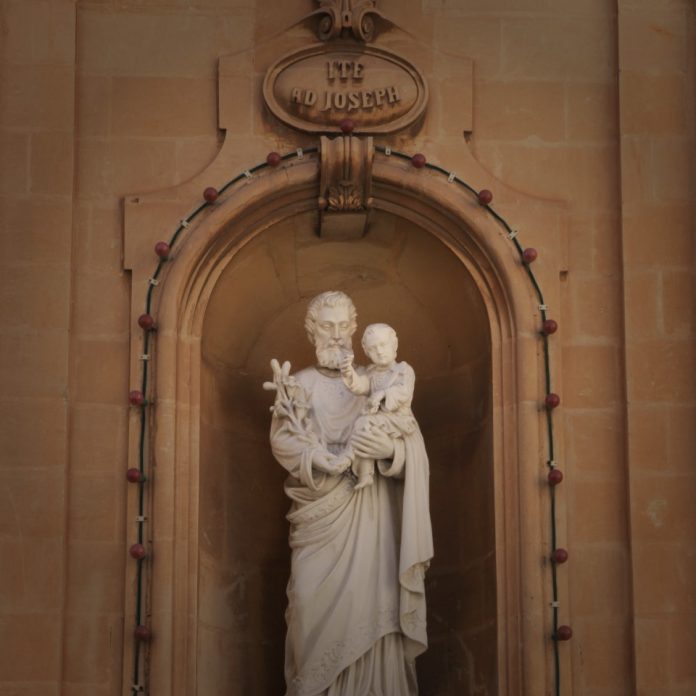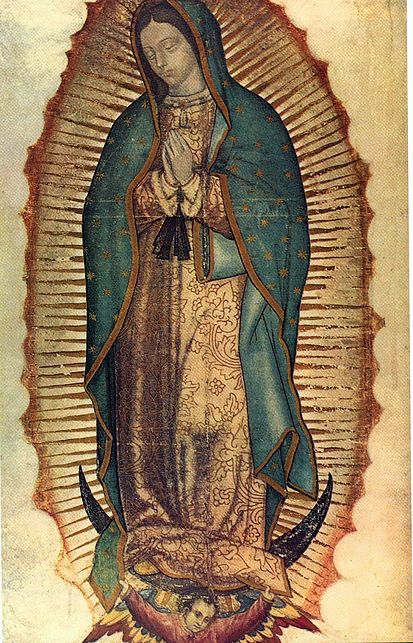On this Feast of Saint Joseph the Worker, let us consider another article which was published on this very same feast day of May 1 in 2019 on Bishop Robert Barron’s Word on Fire website. This article, titled “Ite ad Joseph” and written by Br. Bartholomew Calvano, O.P., from the Dominicans of the Province of St. Joseph discusses the typology between Joseph the Patriarch and Saint Joseph the Virginal Father of Jesus, and relates this to the Feast of Saint Joseph the Worker. However, what I want to focus on in this article is Br. Bartholomew’s argument for Saint Joseph’s Confirmation in the State of Grace and for Saint Joseph’s Prenatal Sanctification using Psalm 105:16-22.
After discussing the typological relationship between Joseph the Patriarch and Saint Joseph, Br. Bartholomew goes on to quote Psalm 105:16-22, and then writes the following:
The description of Joseph bound in fetters and an iron collar is evocative of the bonds of sin. However, it has long been the tradition of the Church that St. Joseph, the husband of Mary, never committed a single actual sin; however, unlike Mary he was not immaculately conceived, and he came into being with the fetters of original sin. Yet, just as the king released Joseph, the son of Israel, from his bonds and set him over his household, so also God released Joseph, the husband of Mary, from his bonds of sin and set him over the Holy Family as its head.[1]
Br. Bartholomew refers to Saint Joseph’s Confirmation in the State of Grace in the following line: “However, it has long been the tradition of the Church that St. Joseph, the husband of Mary, never committed a single actual sin.” This is because the Josephological teaching of Saint Joseph’s Confirmation in the State of Grace states precisely what Br. Bartholomew stated in the foregoing line, viz., that Saint Joseph never committed one actual sin — i.e., mortal sin or venial sin — during his entire earthly life.[2] Next, Br. Bartholomew refers to Saint Joseph’s Prenatal Sanctification in the following line: “however, unlike Mary he [i.e., Joseph] was not immaculately conceived, and he came into being with the fetters of original sin.” This is because Saint Joseph’s Prenatal Sanctification is exactly what is being described by Br. Bartholomew in the foregoing quote: Saint Joseph was not conceived without Original Sin like Mary was, but was rather conceived with it and soon after was cleansed from Original Sin before Joseph was born.[3] Finally, in the last line of the article, Br. Bartholomew utilizes biblical typology between Joseph the Patriarch and Saint Joseph to argue for the reality of both Saint Joseph’s Confirmation in the State of Grace and his Prenatal Sanctification: “Yet, just as the king released Joseph, the son of Israel, from his bonds and set him over his household, so also God released Joseph, the husband of Mary, from his bonds of sin and set him over the Holy Family as its head.”
While I truly enjoyed this article written by Br. Bartholomew mainly because it opened my eyes to the fact that subjecting Psalm 105:16-22 to a typological analysis of its Allegorical Sense of Scripture yields the foreshadowing or prefigurement of both Saint Joseph’s Confirmation in the State of Grace and his Prenatal Sanctification, which was something that I never realized before, I must say that it is not possible to argue that these two privileges existed in Saint Joseph merely from biblical typology according to the Allegorical Sense of Scripture as Br. Bartholomew does in this article. The reason for this is the same one which I presented in my previous article on Catholic Insight,[4] which I will echo in what follows. It is clear from the Summa Theologiae of Saint Thomas Aquinas that the Allegorical Sense of Scripture is not sufficient to argue for the historical reality of an occurrence of something like Saint Joseph’s Confirmation in the State of Grace or his Prenatal Sanctification.[5] The reason that this is so is because according to Thomas’ teaching the purpose or function of the Allegorical Sense of Scripture is to indicated biblical typology, whereas the purpose or function of the Literal or Historical Sense of Scripture is to indicate the truth of a historical reality of some such occurrence like Saint Joseph’s Confirmation in the State of Grace or his Prenatal Sanctification.[6] Further, the Historical or Literal Sense of Psalm 105:16-22 refers not to Saint Joseph the Image of God the Father, but refers instead to Joseph the Patriarch, and hence the words of Psalm 105:16-22 establish the historical reality of the things which transpired in the life of the Old Testament Joseph and not those of the New Testament Joseph, including Saint Joseph’s Confirmation in the State of Grace and his Prenatal Sanctification.
Ergo, based on the foregoing, it is not possible to use the allegorical sense of Psalm 105:16-22 to argue for the historical reality of both Saint Joseph’s Confirmation in the State of Grace and his Prenatal Sanctification, and neither is it possible to use the Historical or Literal Sense of Psalm 105:16-22. The only option left to find out whether or not Saint Joseph truly never committed one actual sin and whether or not he was born from his mother’s womb without Original Sin is to look in the Historical or Literal Sense of the Gospels, since only these books of the Bible contain information about the life of Saint Joseph, and according to the Josephologist Father Francis Lad Filas, S.J., S.T.D., there is no evidence in Sacred Scripture for either Saint Joseph’s Prenatal Sanctification[7] or his Confirmation in the State of Grace.[8] Ergo, we do not have the certitude of the Catholic Faith to assure us that Saint Joseph was born without Original Sin and that he never committed any actual sin, are only left with probabilities, albeit strong ones.[9]
Nevertheless, there is still hope for finding certitude for the existence of Saint Joseph’s Confirmation in the State of Grace and his Prenatal Sanctification. Theologians have made miscalculations and have drawn wrong conclusions before, as is evidenced in the case of Saint Thomas Aquinas’ stance on the Immaculate Conception, and hence it is still possible to find evidence in the Holy Bible for the historical existence or reality of Saint Joseph’s Confirmation in the State of Grace and his Prenatal Sanctification. Indeed, such a discovery seems to be imminent, since there are places in Sacred Scripture which speak of a coming of a reign of Christendom over the whole world,[10] and various approved or credible private revelations also prophecy of this “Age of Peace” or “Age of Mary.’[11] One private revelation, however, merits special attention. It is the prophecy of Father Isidore of Isolanis, the Dominican Scholastic Theologian who wrote the first great treatise in Josephology called Summa de Donis Sancti Ioseph. In his magnum opus on Josephology, he prophesies not only of this restoration of Christendom over the whole world, but he also prophesies that the honor which all people will give to Saint Joseph is a necessary condition or prerequisite for the arrival of this Age of Peace upon the entire earth,[12] and it seems that this honor consists in dogmatic definitions and pronouncements concerning privileges belonging to Saint Joseph like his Confirmation in the State of Grace and his Prenatal Sanctification. For one of the conditions or prerequisites for a Catholic Doctrine to become a Dogma of the Church is its foundation in Tradition or Scripture,[13] and since Sacred Scripture inerrantly prophesies of the coming Age of Peace and since the prophesy of Isidore of Isolanis seems to suggest that the dogmatic definition of the Josephological dogmas are a condition or prerequisite to this Age of Peace, then it is logical to conclude and to even hope that some Josephologist someday will find Scriptural basis for both Saint Joseph’s Confirmation in the State of Grace and his Prenatal Sanctification.
Hence, this Feast Day of Saint Joseph the Worker, let us pray to Saint Joseph not only that these two privileges along with others connected with him may be dogmatically defined, but also that some Josephologist somewhere may discover a scriptural foundation or biblical basis for them. For once these things happen, we can be assured that Jesus Christ the King of the Universe and His Queen Mary the Mother of God will extend His kingdom the Catholic Church over the whole world, so that not only will all honor Jesus and Mary in the Catholic Church, but also so that all will honor His father and her husband Joseph of the New Testament as all honored Joseph the Patriarch of the Old.[14]
[1] Br. Bartholomew Calvano, O.P., “Ite ad Joseph,” Word on Fire, May 1, 2019, https://www.wordonfire.org/articles/ite-ad-joseph/.
[2] For more on Saint Joseph’s Confirmation in Grace, see Joshua Francis Filipetto, “What We Should Believe About Saint Joseph,” Catholic Insight, September 15, 2022, https://catholicinsight.com/what-we-should-believe-about-saint-joseph/ and Joshua Francis Filipetto, “Saint Joseph’s Confirmation in Grace,” Catholic Insight, December 15, 2023, https://catholicinsight.com/saint-josephs-confirmation-in-grace/.
[3] For more on Saint Joseph’s Prenatal Sanctification, see Joshua Francis Filipetto, “What We Should Believe About Saint Joseph,” Catholic Insight, September 15, 2022, https://catholicinsight.com/what-we-should-believe-about-saint-joseph/.
[4] Joshua Francis Filipetto, “Saint Joseph’s Confirmation in Grace,” Catholic Insight, December 15, 2023, https://catholicinsight.com/saint-josephs-confirmation-in-grace/.
[5] Saint Thomas Aquinas, Summa Theologiae, trans. Fr. Laurence Shapcote, O.P., ed. John Mortensen and Enrique Alarcón (Lander: The Aquinas Institute for the Study of Sacred Doctrine, 2012), I, q. 1, a. 10, ad 1, https://aquinas.cc/la/en/~ST.I, emphasis in bold and in italics is mine: “Et ita etiam nulla confusio sequitur in sacra Scriptura, cum omnes sensus fundentur super unum, scilicet litteralem; ex quo solo potest trahi argumentum, non autem ex his quae secundum allegoriam dicuntur, ut dicit Augustinus in epistola contra Vincentium Donatistam. [Thus in Holy Writ no confusion results, for all the senses are founded on one—the literal—from which alone can any argument be drawn, and not from those intended in allegory, as Augustine says (Epis. 48).]”
[6] Ibid., co.
[7] Francis L. Filas, S.J., S.T.D., Joseph Most Just: Theological Questions about St. Joseph (Milwaukee: The Bruce Publishing Company, 1956), 60, https://books.google.ca/books/about/Joseph_Most_Just.html?id=RZeItgAACAAJ&redir_esc=y, emphasis in bold is mine: “We come now to the question concerning the sanctification of St. Joseph in the womb of his mother [i.e., his Prenatal Sanctification]. This doctrine, like several others concerning the Saint, was first proposed by John Gerson in his sermon at the Council of Constance in 1416. Other pioneers of the devotion to St. Joseph also held the doctrine: Isidor de Isolanis, Bernardine of Busti, and Alphonsus Liguori. Liguori makes the assertion that Suarez holds the view also, but Suarez actually refuses to take such a stand, or in fact any stand. He believes that since both Scripture and the official tradition of the Church are silent on the point [of the reality of Saint Joseph’s Prenatal Sanctification], we do not have sufficient evidence to form a correct judgment.”
[8] Ibid., 64-65, emphasis in bold is mine: “To begin with, we must affirm without the slightest hesitation that the Saint was not impeccable. We use the word in this sense: the possibility of sin existed in Joseph’s life. His could never be, for example, the sinlessness of Jesus, for whom it was impossible to violate the law of God because of the union of the human and the divine nature in the Second divine Person. We are concerned with the fact, rather than the possibility of Joseph’s sinning, in so far as this fact or absence of fact can be deduced from theological reasoning. In other words, did St. Joseph ever commit actual sin? Or was he given such graces that the inclination to sin was restrained in him, and he was able to avoid not only mortal but also venial sin? On this subject dogmatic certitude either from Holy Scripture or from official Church teaching does not exist. It must be remembered that our findings are based on theological probability according to the evidence at hand.”
[9] Ibid; Joshua Francis Filipetto, “What We Should Believe About Saint Joseph,” Catholic Insight, September 15, 2022, https://catholicinsight.com/what-we-should-believe-about-saint-joseph/; Joshua Francis Filipetto, “Saint Joseph’s Confirmation in Grace,” Catholic Insight, December 15, 2023, https://catholicinsight.com/saint-josephs-confirmation-in-grace/.
[10] Psalm 21:28-29 (Douay-Rheims); Psalm 85:9 (Douay-Rheims); Daniel 2:35 (Douay-Rheims); Revelation 15:4.
[11] “St. Joseph: Patron of the Triumph of Mary’s Immaculate Heart,” Sensus Fidelium, September 20, 2015, https://www.youtube.com/watch?v=eu-DVXd7PtU, 15:08-18:52; “Lenten Mission on St. Joseph: Patron of An Age of Peace,” Sensus Fidelium, May 21, 2020, https://www.youtube.com/watch?v=r9jdgBpI17A, 11:26-17:12; “Lenten Mission on St. Joseph: Joseph and the End Times,” Sensus Fidelium, May 22, 2020, https://www.youtube.com/watch?v=U5t_uGBgts0, 20:59-25:35; “Lenten Mission on St. Joseph: All Powerful Intercession,” Sensus Fidelium, May 23, 2020, https://www.youtube.com/watch?v=6HwDNEuDI70&t=2610s, 43:30-44:03; Dr. Taylor Marshall, “GREAT FRENCH MONARCH of the End Times: Who is he? 14 Prophecies,” YouTube, May 22, 2020, https://www.youtube.com/watch?v=tWRRHCrAhYY; Dr. Taylor Marshall, “Reign of Mary before Antichrist (from St Louis de Montfort),” YouTube, May 22, 2020, https://www.youtube.com/watch?v=c-P1J4LIpSU.
[12] Fr. Isidorus de Isolanis, O.P., Summa de Donis Sancti Ioseph (1522), Denuo Edita Berthier, (Rome: S.C. de Propaganda Fide, 1887), tertia pars, cap. vi (171) and cap. viii (177-178), https://books.google.ca/books/about/Summa_de_donis_de_S_Joseph.html?id=MfQXmAEACAAJ&redir_esc=y: The following is the prophecy from Father Isidore of Isolanis, who prophesied that Saint Joseph would receive various honors before the Second Coming of Christ and before the coming of the Age of Peace, including the honor of being named Patron of the Universal Church. Some parts of this amazingly accurate prophecy have already been fulfilled, e.g., the proclamation of Saint Joseph by Blessed Pope Pius IX as Patron of the Universal Church, and hence these fulfillments of this prophecy establish the accuracy, veracity, and credibility of it in addition to the ecclesiastical approbation for this treatise in Josephology in which this prophecy is found and in addition to the high praise that Summa de Donis Sancti Ioseph received from Pope Benedict XIV. Thus, this prophecy from Father Isidore seems to prophesy that there will be some Josephological dogmas proclaimed by the Pope at some point in the future as well. Here is Father Isidore’s prophecy in Latin with my English translation: “Ultima particula erit exultatio ingens futura in militanti Ecclesia pro sanctitatis divini Ioseph certa notitia. Non enim Spiritus Sanctus deficiet a movendis cordibus fidelium, donec omne imperium militantis Ecclesiae exultans, divinum Ioseph nova prosequatur veneratione, condat coenobia, ecclesias ac altaria in eius erigat honore. Haec autem aptis imaginibus mystice designantur [cap. vi (171)] …Post quae suscitavit Dominus sanctum Ioseph sibi, ad honorem nominis sui, caput et patronum peculiarem imperii militantis Ecclesiae. Ante quoque diem iudicii futurum est ut omnes populi cognoscant, venerentur et adorent nomen Domini, ac magna Dei munera quae Deus ipse in sancto posuit Ioseph, et latere pene voluit longa per tempora. Quocirca abundabit nomen sancti Ioseph muneribus omnium bonorum terrae. Ædificabunt templa ad illius honorem, festa celebrabunt et vota vovebunt eidem populi et solvent. Aperiet enim Dominus aures praecordiorum intellectus, et viri magni scrutabuntur interiora Dei dona in sancto abscondita Ioseph, et invenient thesaurum optimum, qualem apud sanctos patres Veteris Instrumenti non invenerunt…In calendariis sanctorum nomen decantabitur sancti Ioseph, et iam non erit in caudam, sed in caput. Fiet enim de illo festum praecipuum et venerabile. Mandabit enim Christi Vicarius in terris, Sancto suadente Spiritu, ut festum patris putativi Christi, sponsi Reginae mundi, hominis sanctissimi, celebretur in omnibus finibus imperii militantis Ecclesiae [cap. viii (177-178)]. [There will be an ultimate, particular, [and] huge exultation in the future in the Church militant for the certain fame of the holiness of the divine Joseph. For the Holy Spirit will not withdraw from moving the hearts of the faithful, until all the exulting empire of the Church militant regards the divine Joseph with new veneration, builds monasteries, erects churches and altars in his honor. Moreover these [things] are designated mystically by true images [chapter 6 (171)] …After which the Lord raised up Saint Joseph to Himself [to be] the head and the special patron of the empire of the Church militant for the honor of His own name. Before the day of judgement it will also be that all peoples know, venerate, and adore the name of the Lord and the great gifts of God which God Himself placed in Saint Joseph and willed almost to hide for a long time. Therefore the name of Saint Joseph will abound in the gifts of all the good [people] of the earth. They will build temples for the honor of him, they will celebrate feast-days, and the same peoples will vow vows and fulfill [those vows]. For the Lord will open the ears of the hearts of the understanding, and great men will scrutinize the interior gifts of God hidden in Saint Joseph, and they will find the greatest treasury, such as was not found among the holy fathers of the Old Testament…In the calendars of the saints the name of Saint Joseph will be sung, then no longer will it be toward the end, but toward the beginning. For a venerable and special feast will be made about him. For the Vicar of Christ on earth will mandate by [means of] the urging Holy Spirit that a feast-day of the putative father of Christ, of the spouse of the Queen of the world, of the most holy man, be celebrated in all the ends of the empire of the Church militant [chapter 8 (177-178)]].”
[13] Dr. Ludwig Ott, Fundamentals of Catholic Dogma, ed. James Canon Bastible, D.D., trans. Patrick Lynch, Ph.D. (Charlotte: TAN Books, 1974), 4, emphasis in italics is mine: “Two factors or elements may be distinguished in the concept of dogma :— a) An immediate Divine Revelation of the particular Dogma (revelatio immediate divina or revelatio formalis) i.e., the Dogma must be immediately revealed by God either explicitly (explicite) or inclusively (implicite), and therefore be contained in the sources of Revelation (Holy Writ [i.e., the Holy Bible or Sacred Scripture] or Tradition).”
[14] Genesis 41:37-45, 54-57.











